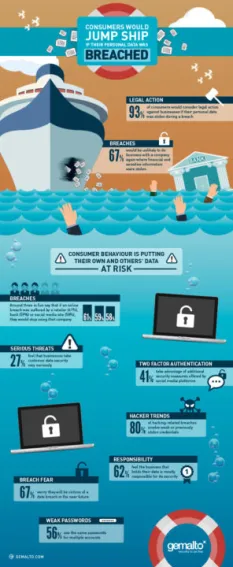
Consumers' sentiments on customer data security revealed
A majority (70%) of consumers would stop doing business with a company if it experienced a data breach, according to a survey of more than 10,000 consumers worldwide conducted on behalf of computer security service provider Gemalto.
In addition, seven in ten consumers (69%) feel businesses don’t take the security of customer data very seriously.
Despite these concerns, the Gemalto study found that consumers are failing to adequately secure themselves, with over half (56%) still using the same password for multiple online accounts. Even when businesses offer robust security solutions, such as two-factor authentication, two fifths (41%) of consumers admit to not using the technology to secure social media accounts, leaving them vulnerable to data breaches.
This may be because the majority of consumers (62%) believe the business holding their data is mostly responsible for its security. This is resulting in businesses being forced to take additional steps to protect consumers and enforce robust security measures, as well as educate them on the benefits of adopting these.
Retailers (61%), banks (59%) and social media sites (58%) were found to have a lot of work to do, with these being sectors that consumers would leave if they suffered a breach.
“Consumers are evidently happy to relinquish the responsibility of protecting their data to a business, but are expecting it to be kept secure without any effort on their part,” says Jason Hart, CTO, Identity and Data Protection at Gemalto. “In the face of upcoming data regulations such as GDPR, it’s now up to businesses to ensure they are forcing security protocols on their customers to keep data secure. It’s no longer enough to offer these solutions as an option. These protocols must be mandatory from the start – otherwise businesses will face not only financial consequences, but also potentially legal action from consumers.”
Despite their behaviour, consumers’ security concerns are high, as two thirds (67%) worry they will be victims of a data breach in the near future. Consequently, consumers now hold businesses accountable – if their data is stolen, the majority (93%) of consumers would take or consider taking legal action against the compromised business.



















 Advertise
Advertise





